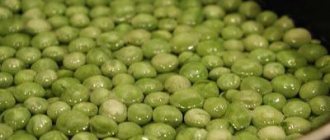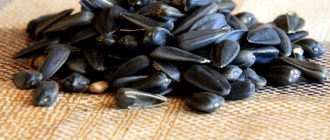Olives are often included in the Mediterranean diet. They have a positive effect on many body systems: heart, blood vessels, digestion and metabolism. But not all fruits are suitable for the diet. Depending on the cooking method, they can interfere with weight loss, and sometimes even provoke weight gain. It is important to monitor the amount of salt and spices in the marinade.
The average calorie content of the product per 100 g is about 140 kcal . At the same time, they contain almost 15 g of fat, approximately 1 g of protein and carbohydrates.
Beneficial properties of olives:
- contain polyunsaturated omega-3 acids, B vitamins (calms the nervous system, prevents eating problems);
- rich in folic acid, vitamins E, K, C, A, magnesium, iron, iodine, calcium, selenium, potassium and phosphorus, which improves the condition of hair, skin, nails;
- contain pectins, which are necessary for normal intestinal function, promote the removal of waste and toxins, heavy metal salts;
- fiber in the composition helps cleanse the body;
- the fruits have a positive effect on the gallbladder and improve the functioning of the digestive system;
- help control appetite by reducing the production of gastric juice;
- give vigor, energy, improve mood;
- help reduce bad cholesterol in the blood;
- oleic acid improves metabolism, which helps lose weight;
- Contained antioxidants prevent premature aging.

When losing weight, it is advisable to consume no more than 80 g of olives . They can be eaten as a separate dish, added to salads, sandwiches and snacks. Nutritionists recommend eating fresh olives in the morning, 12-14 pieces instead of breakfast . Only after a couple of hours can we have lunch.
Fresh fruits should be firm, uniform in color, without white spots or stripes. If it is not possible to buy them, then canned ones should be chosen with as few spices, additives and “chemicals” as possible . But losing weight on such olives will occur much more slowly, since they are able to retain liquid, and with it toxins.
Olives have no side effects or contraindications . The most negative point is that due to exceeding the amount of product, a person will not lose weight. Those who have liver problems should not overeat them. Not recommended for people suffering from colitis, kidney problems, stomach and duodenal ulcers. And because of the vinegar in canned ones, those with allergies should not eat them.

Fresh olives are not mixed with dairy products to avoid causing stomach upset. That’s why they put marinated ones in salads with cheeses.
The main difference between olives and black olives is the degree of ripeness . Olives are fully ripe olives, so they are usually sent for oil. And in order to give green fruits a black color, they are subjected to a special treatment - oxidation with oxygen. So store-bought, marinated dark olives are no different from olives.
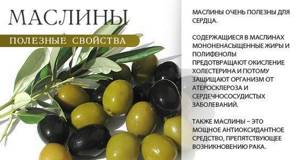
Real black olives contain about 170 kcal per 100 , which is not much more than green ones. At the same time, they also contain 16 g of fat and almost 1 g of protein and carbohydrates. They can be eaten when losing weight, but in smaller quantities.
Flavonoids help maintain youth and health of the body, help digestion and absorption of food.
Read more in our article about olives and olives for weight loss.
General characteristics of olives

Olea europae L. (names European olive, Olive tree, Olive tree, European olive) is a small evergreen shrub or tree, 3-7 meters high, of the Oleaceae (olive) family with cracking grayish bark. Cultivated in the Mediterranean countries, America, Africa and South Asia. On the territory of the former USSR it grows in the Caucasus, Transcaucasia, the Crimean Peninsula, and Central Asia. In a favorable climate, it produces yields of 20-40 kg per tree.
The fruit is a drupe, with a hard stone and oily fleshy pulp containing up to 80% oil, oblong, ovoid in shape. From 90% of the harvest, oil is produced, the elite varieties of which are called Provençal, 10% is preserved.
Ripe drupes are called black olives (in Russia - olives), unripe ones - green olives. Olives come in brown, dark purple, burgundy, and black colors. Olives and black olives are similar in composition, but the latter contain more oil and fat.
The oil contains oleocyanin, a group of glycerides (linoleic, arachidic, oleic acids), and sterols. Olive leaves contain camphene and 0.04% essential oil.
Reviews
Tatyana, 32 years old, Lipetsk: “I took a tablespoon of olive oil on an empty stomach, washed it down with a glass of still water with the addition of a teaspoon of honey and lemon juice. All ingredients are available. At the same time, the number of calories per day should not exceed 2000, otherwise weight gain will occur. Advantages of the diet: I managed to lose weight after giving birth. Disadvantages: I don’t want to take the oil in the morning.”
Lyubov, 40 years old, Astrakhan: “For a month I took the oil in the morning. On the first day, it was difficult to drink a full spoon of oil, especially not to eat for an hour after that. A week later, the portion was increased to 1.5 tbsp. l. I lost 4 kg in a month, and I didn’t stick to any diet, I just ate healthy foods and did exercises.”
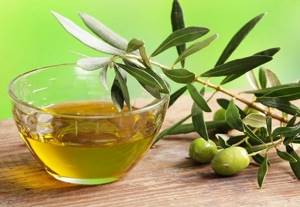
Did you know that olives are the fruits of the evergreen Olive tree or, as it is also called, the European Olive tree, a real “long-liver”. After all, it is very hardy and “lives” up to two thousand years.
Olive trees are grown in Greece, Israel, Italy, Spain, North Africa, Azerbaijan, Transcaucasia, Crimea and the southeastern United States.
Olives and olives are the fruits of the same tree, only in our country they are separated by color: olives are green, olives are black.
Olives are grown either for pickling and canning or for oil production. Olive oil is a high-quality edible oil that is used in cooking around the world. In addition, it is widely used in the chemical industry, medicine, soap making and perfumery.
Having virtually no negative effects on the human body, olive oil is an excellent means of protecting it from various diseases, including cardiovascular diseases and cancer.
Olives are preserved in various ways: with and without pits, as well as with all kinds of fillings. Canned olives are added to cold and hot dishes: salads, appetizers, pizza, soups, pastas, stewed vegetables, poultry and meat dishes.
Composition and calorie content of olives On average, 100 g of olives contains about 145 kcal. These are very healthy fruits because they contain proteins, vitamins, as well as micro and macroelements.
100 g of canned olives contains: proteins - 1 g, fats - 15.3 g, water - 75.3 g, carbohydrates - 0.8 g, fiber - 3.3 g, ash - 4.3 g. And also, vitamins: A, B1, B2, B4, PP, B5, B6, folic acid, E, K, C.
Healing properties

When deciding whether it is possible to eat olives on a diet, it is enough to study the composition of the product to understand that it is indispensable for losing weight and allows you to put your body in order:
- Unsaturated fatty acids, unlike animal fats, prevent the development of heart and vascular diseases and atherosclerosis.
- Oleic acid is a strong antioxidant that prevents the formation of breast cancer.
- Pectins remove heavy metal salts and toxins, which is especially important for residents of megacities.
- B vitamins stimulate the nervous system, improving mood and giving an energy boost.
- Calcium strengthens bone tissue, helps fight arthrosis, osteochondrosis and arthritis.
- The combination of vitamins E and C reduces oxidative processes, prevents the development of cancer, has a powerful antioxidant and anti-inflammatory effect, and reduces swelling.
- Manganese is responsible for muscle tone.
- Essential oils nourish the skin, smooth out wrinkles, and remove age spots.
- Glutathione strengthens the immune system and improves the quality of lymphocytes.
Decoctions and infusions of the leaves lower blood pressure, regulate intestinal activity and heart rate, and are used in cosmetology.
The combination of antioxidants and healthy fats makes olives an indispensable component of weight loss diets.
The benefits of olives for weight loss
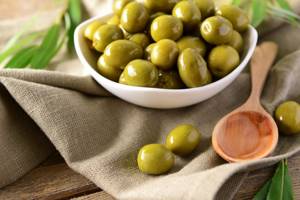
When asking the question whether you can eat olives on your diet, you need to remember that this is a unique product that helps restore and balance the functioning of the body. Black olives remove toxins and normalize the functioning of the gastrointestinal tract:
- Linoleic acid, a polyunsaturated omega-6 fatty acid, helps lower cholesterol, burn fat and promote natural weight loss.
- Fats and oils saturate the body with nutrients, allowing you to quickly satisfy your hunger.
- An infusion of European olive leaves slows down intestinal motility, reducing appetite, and has diuretic properties, preventing fluid retention.
Olives give the body a boost of energy without increasing blood glucose levels, allowing you to be alert and active throughout the day.
Daily intake of fruits and infusion of leaves helps to quickly lose excess weight.
Contraindications

Excess weight is most often the result not only of a sedentary lifestyle, but also of serious diseases associated with metabolic disorders, therefore olives are contraindicated in the diet for the following health problems:
- Cholecystitis,
- Removed gallbladder,
- Pancreatitis,
- Diarrhea,
- Hypotension.
Olive oil increases the secretion of bile, which is unacceptable in the absence of a gallbladder, since the bile ducts cannot cope with its influx. The fruits and decoction of olive leaves are used in folk medicine to treat hypertension, but they can cause dizziness with low blood pressure.
How to choose
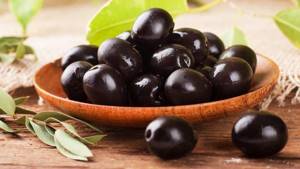
Olives are healthier than green olives; oil is made from them, and they contain the maximum amount of healing substances. Fresh drupes that have not been subjected to heat treatment are healthier. High-quality fruits are elastic, without whitish spots.
Natural olives can be bought in markets during the short ripening season from October to December; in the remaining months, canned fruits are available. It is important to choose the right olives when on a diet so that they bring benefits and not harm:
- The fewer degrees of processing a product has undergone, the healthier it is.
- Spanish black olives are usually less salty than Greek ones, and salt retains water in the body, making it difficult to lose weight.
- Glass containers are better than tin cans. When damaged, the metal reacts chemically with the olives, making them a dangerous product.
- Ripe, high-quality olives with pits, since their pulp is too soft for the extraction procedure.
- When making stuffed olives, more preservatives are used; it is better to avoid them.
Under no circumstances should you eat olives that have been artificially turned black.
They are produced from green fruits, quickly removing bitterness by soaking in a solution of caustic soda (additive E 524). The thick dark shade is given by the food additive E 579 (iron gluconate). Black oxidized olives will do more harm than good.
Delicious recipes
Olives are a sought after food. They are used in preparing snacks. To do this, combine it with garlic, herbs, olive oil and chopped nuts. Or you can mix it with pepper, honey, vinegar, olive oil and leave for a while.
You can prepare a salad . For this you will need:
- tomatoes - 2 pcs.;
- cucumbers - 2 pcs.;
- sweet pepper - 1 pc.;
- onion - 1 pc.;
- oregano - 1 tsp;
- cheese - 100 g;
- olives - 150 g;
- olive oil - 2 tbsp. l.
The benefit of this salad is that all ingredients are taken fresh, without heat treatment. Just chop the ingredients and add butter. You can mix the ingredients or make a layered salad. The first layer is cucumbers, salt and oil. Then come peppers, onions, tomatoes, olives and cheese. Top the salad with a mixture of oil and oregano.
Appetizer of celery with olives . For preparation you will need:
- 1 stalk of celery;
- 1 tbsp. l. low-fat cream cheese;
- 5 pieces. stuffed olives.
A layer of cheese is applied to a celery stalk cut lengthwise. Sliced olives are placed on top.
This product can be marinated. Ingredients:
- olives - 1 glass;
- olive oil - 2-3 tbsp. l.;
- celery - 1 pc.;
- garlic - 2 cloves;
- chili pepper - 1 pc.;
- chopped parsley - 3 tbsp. l.;
- wine vinegar - 1 tsp;
- dried oregano - 1/8 tsp.
Olives must be washed in water and dried. After this, add oil and stir. Add garlic, celery, a couple of tablespoons of parsley, vinegar and chili. Stir and leave for half an hour at room temperature. Then you need to put everything on a plate, sprinkling oregano and the remaining parsley on top.
Mediterranean tuna salad . Components:
- garlic - 1 clove;
- olive oil - ¼ cup;
- lemon juice squeezed from half the fruit;
- olives - 100 g;
- tuna in its own juice - 2 cans;
- onion - 1 pc.;
- parsley, pepper and salt - to taste.
The garlic should be finely chopped, combined with salt and crushed. Separately, mix lemon juice, oil, parsley, pepper, minced garlic with salt and mashed tuna with a fork. Add onions and olives. Season with a couple of tablespoons of tuna juice and stir until smooth.
How to eat olives on a diet
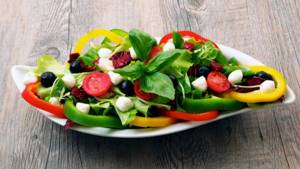
When dieting, you need to include foods in your diet that do not interfere with weight loss. In what form and quantity you can eat olives on a diet, you need to consult a nutritionist. An experienced specialist develops a diet individually for each patient.
There are diets designed for 5, 7 days, and even a month, consisting only of olives and olive oil. This is fundamentally wrong. Nutrition should be balanced; any “distortions” will lead to metabolic disorders, health problems and even more weight gain.
The calorie content of olives is 130-165 kcal per 100 g, so they will only bring benefits if consumed in moderation:
- Fresh fruits are the healthiest. They can be eaten up to 80-90 g per day separately or in vegetable salads, seasoned with lingonberry, cranberry or lemon juice. Such snacks will help the absorption of polyunsaturated fatty acids, and the coarse fiber of vegetables will create a satiating effect, preventing you from overeating.
- Vegetable salads can be seasoned with cold-pressed olive oil (no more than 1 tablespoon per day).
- Once a week, breakfast is good to replace with 14-15 fresh black olives.
- Canned olives are not an equivalent substitute for fresh fruit. They contain a lot of salt, which delays the excretion of water and increases blood pressure. It is better to eat 5-7 of them per day. After heat treatment, the vitamins in the drupes are destroyed, the remaining beneficial substances are preserved, but in smaller quantities than in fresh fruits.
The piquant taste of olives allows them to be used in a diet, making the menu varied and tasty. They are added to soups, served as a sauce for meat, and used to make a paste that is placed on bread instead of butter.
Principles of use for weight loss
For those people who decide to regain their slimness, you can start taking 1 tsp on an empty stomach. olive oil. If the body does not respond with unpleasant symptoms, the procedure is repeated in the evening, before bed. Gradually the norm increases to 1 tbsp. l.
Patients with gastritis should drink a glass of warm water along with the oil. To cleanse the digestive tract, intestines and liver, add 200 ml of tomato juice to the drink.
In addition, the oil is used as a salad dressing, but it should be remembered that the daily intake should not exceed 2 tbsp. l.
To increase the beneficial effect, the product can be combined with lemon juice. A mixture is made of 1 citrus fruit and 50 ml of oil. On the day of taking this composition, the menu should contain only raw vegetables and fruits. At the same time, you should drink a lot of water. The mixture should not be consumed on an empty stomach. It is better to swallow it before bed, mixing the ingredients and without drinking anything.
Thanks to olive oil, the level of bad cholesterol in the body is reduced. In addition to this, the oil helps to increase the amount of substances that destroy fats.






